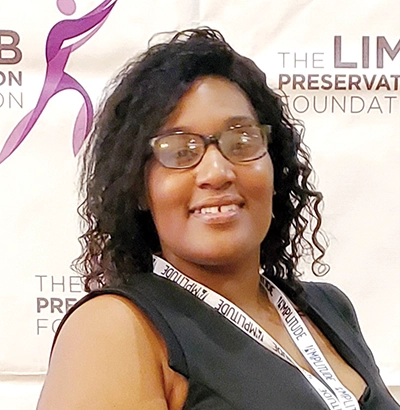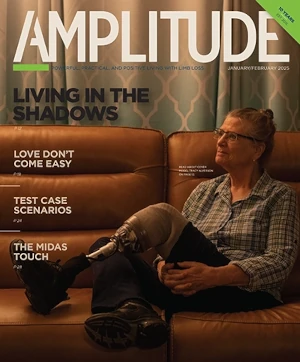By Armeda Batchler and Brianna Jones

Armeda Batchler
This article is adapted from an interview with Armeda Batchler and Brianna Jones. These two above-knee amputees met in 2016 through an amputee support group in Las Vegas, and they have been an inseparable pair ever since. Both women say the friendship has had profound benefits for their mental health.
ARMEDA: I had amputation surgery in October 2013. I was looking for someone to talk to about being an amputee, but there was really no one I could talk to. There was an amputee support group in Las Vegas, but the guy who was in charge had to stop doing it. I found him online, he gave me all his contacts, and I started the group back up. And that’s how I met Bree.
BRIANNA: I lost my leg in April 2015 due to cancer. I didn’t have any information or any resources. I thought life was over. I lost my entire leg, I’m in pain, and nobody around me knows how I’m feeling. I already felt like a burden, because I needed a lot of physical help. Depression came, and anxiety came, and that was hard.
ARMEDA: My emotional journey kind of went backward. I was doing so much when I had my amputation that I just had to keep going. My daughter was one year old, and parenting doesn’t stop. And I’m a very prideful, stubborn person, so I’m not going to ask for help. But three years after my amputation, it started to take a toll on me. My daughter was starting school the next year, and I wanted to prepare her for kindergarten, so I stopped working. And I think that allowed the depression to set in. I started feeling like a burden. It was a really deep, dark hole.

Brianna Jones
BRIANNA: One thing that I skipped was grieving. Everything changes so fast, but I never really sat down to grieve. Every patient should be permitted that. I would see other people who lost a limb, and they’d be doing great while I’m doing horrible. It takes time to accept it. You just gotta be patient with the process. Give it time—not a day, not a month, not a year. It’s gonna take several years.
ARMEDA: We all learn from each other and with each other, because we all experience things at different times. And being an amputee, other people don’t always know how to help you when you’re going through things. I don’t always know how to talk to my mother, my brother, or my daughter about some things, and they won’t always understand.
BRIANNA: Amputees just want to see people who look like themselves. You want to hear about how other people are solving problems. Or maybe they don’t even have a solution, but you can still learn from their experience. When I met Armeda, she was driving, she was working, she had a daughter. That let me see there are still people out here living, post-limb loss. After that, we became really close friends, and we’ve always bounced off each other and tried to advocate for each other. Just knowing there are other people out there and you’re not alone, that really helps.
ARMEDA: Being advocates for each other and just knowing each other’s survival stories, that’s what is strong about this whole community. Now that I’m out from under my cloud and I’m feeling good, I want to be able to help other people. I don’t want others to get into that deep hole, because it’s hard to get out of. I’ve been there. I want to prevent anyone else from going there. That feels like my calling.
BRIANNA: Life is still hard. There are still times where I want to give up. But I just have to keep finding those little things to keep me focused. I made these goals to start seeing what life still has to offer. I kept doing stuff that I already loved to do. I love writing. I like decorating. But I had to learn that I could not go back to being the old me, because you’re not the old you anymore. You have to find the new you.
ARMEDA: What I know now is that you have to accept your bad days. When you’re having a bad day, embrace it. And embrace the fact that you will have more good days, too.




